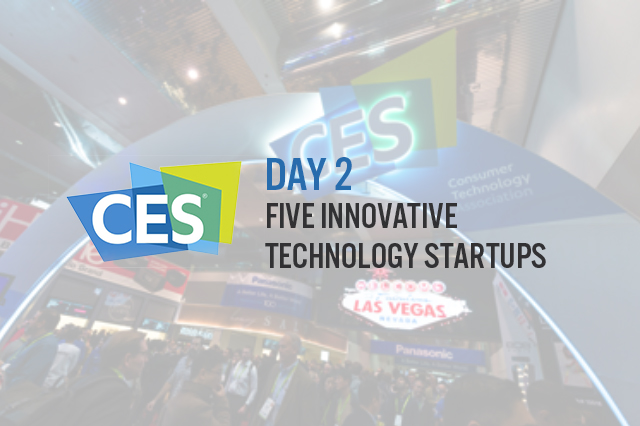
albert Chan
The CES 2019 show is now officially underway, with more than 4,400 companies exhibiting and 182,00 industry professionals checking it all out. CES provides a platform for companies to unveil innovation and discover emerging technologies. This report features a few standout startups we saw on day two.
1. Chronolife is a healthcare technology company based in France that developed the wearable Chronolife vest — which helps people with chronic or congestive heart failure (CHF) anticipate potential medical emergencies. Made of cotton and Lycra, and meant to be worn daily, the vest contains embedded sensors that track things such as heart activity, breathing, body temperature and physical activity. Users can see data on the app, and healthcare providers see the same information to identify signs of danger. More than 5.7 million adults in the U.S. have CHF, according to the Centers for Disease Control and Prevention.
Its estimated retail price is €200 (about $229) and the company plans to target healthcare providers and insurance companies. The Chronolife is waiting for regulatory approval, which it hopes to receive from CE marketing for Europe in the spring and FDA approval for the US this summer.
[caption id="attachment_58956" align="aligncenter" width="276"]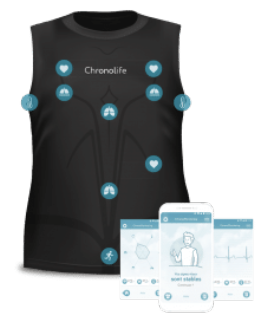 Chronolife Vest
Chronolife Vest
Source: Chronolife[/caption] 2. The Parcel Guard is a smart mailbox developed by Danby Appliances, designed to prevent “porch pirates,” or people who steal items from your porch. The box offers both a drop-in slot for smaller items, as well as a separate door for larger items. When packages are delivered into the door of the mailbox and the door is shut, the Parcel Guard locks. The devices alerts consumers of package arrival with a push notification via the Parcel Guard app. The mailbox is priced at $399 and is addressing a growing issue. During the 2017 holiday season, thieves stole packages from more than 25 million Americans, up from 23.5 million porch thefts in 2015, according to a study released by InsuranceQuotes. [caption id="attachment_58964" align="aligncenter" width="272"]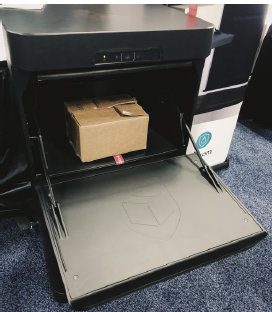 The Parcel Guard
The Parcel Guard
Source: Techcrunch[/caption] 3. P&G Ventures, Procter & Gamble’s startup initiative, unveiled Opté Precision Skincare System. Optéis an at-home skincare device that uses an integrated digital camera and inkjet printer technology to mask age spots on skin. The device scans a person’s complexion, and then corrects hyperpigmentation on the face, neck or arms. The device uses a digital camera with LED lights to scan and detect areas of skin discoloration, blemishes and age spots. Traditional spot coverage options such as makeup or serums often provide imprecise coverage and cover skin that doesn’t need to be covered. The Opté website lists a starter kit for $599. Opté is one of the first brands to emerge from P&G Ventures, which partners with startups, entrepreneurs and innovators to create new businesses. [caption id="attachment_58963" align="aligncenter" width="276"]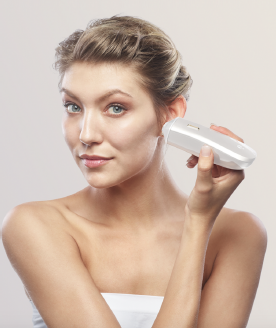 Procter & Gambe's Opté Precision Skincare System
Procter & Gambe's Opté Precision Skincare System
Source: Bizjournals.com[/caption] 4. Smart home devices and solutions have been a big theme at this year’s CES. Capstone’s Smart Mirror, launched by Capstone Connected Home, is integrated with Google Assistant and has touchscreen capabilities. You can talk to Google Assistant via the mirror, watch YouTube videos and download apps from the Google Play store. If you ask to view your email, the mirror will automatically swap to that view. The mirror is managed through the Capstone Connected Control Hub and the first one available for purchase will be 19 x 22 in the first quarter of 2019. Just don’t ask “who is the fairest one of all?” [caption id="attachment_58961" align="aligncenter" width="384"]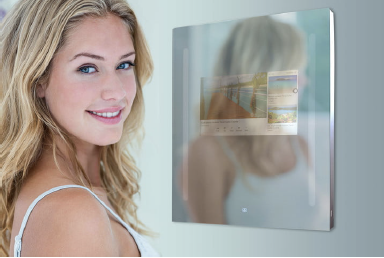 Capstone Connected Home’s Smart Mirror
Capstone Connected Home’s Smart Mirror
Source: Capstone Connected Home[/caption] 5. The Bread Bot, developed by Wilkinson Baking Company, is a fully automated robotic bread-making machine that bakes and sells bread like a vending machine. The company aims to lease the standalone machine to retailers and groceries. After dough mix is poured through a funnel, a multi-step process begins that includes the machine measuring and mixing the dough with water and yeast. Although there is no official pricing, Wilkinson company reps estimate the machine will cost retailers about $100,000 over a five-year lease, according to a report published by CNET. [caption id="attachment_58959" align="aligncenter" width="304"]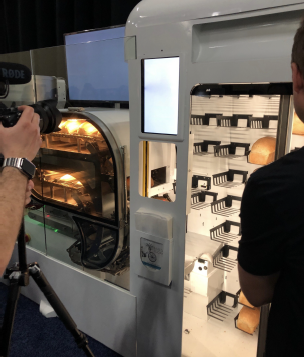 The Bread Bot
The Bread Bot
Source: Coresight Research[/caption]
 Chronolife Vest
Chronolife VestSource: Chronolife[/caption] 2. The Parcel Guard is a smart mailbox developed by Danby Appliances, designed to prevent “porch pirates,” or people who steal items from your porch. The box offers both a drop-in slot for smaller items, as well as a separate door for larger items. When packages are delivered into the door of the mailbox and the door is shut, the Parcel Guard locks. The devices alerts consumers of package arrival with a push notification via the Parcel Guard app. The mailbox is priced at $399 and is addressing a growing issue. During the 2017 holiday season, thieves stole packages from more than 25 million Americans, up from 23.5 million porch thefts in 2015, according to a study released by InsuranceQuotes. [caption id="attachment_58964" align="aligncenter" width="272"]
 The Parcel Guard
The Parcel GuardSource: Techcrunch[/caption] 3. P&G Ventures, Procter & Gamble’s startup initiative, unveiled Opté Precision Skincare System. Optéis an at-home skincare device that uses an integrated digital camera and inkjet printer technology to mask age spots on skin. The device scans a person’s complexion, and then corrects hyperpigmentation on the face, neck or arms. The device uses a digital camera with LED lights to scan and detect areas of skin discoloration, blemishes and age spots. Traditional spot coverage options such as makeup or serums often provide imprecise coverage and cover skin that doesn’t need to be covered. The Opté website lists a starter kit for $599. Opté is one of the first brands to emerge from P&G Ventures, which partners with startups, entrepreneurs and innovators to create new businesses. [caption id="attachment_58963" align="aligncenter" width="276"]
 Procter & Gambe's Opté Precision Skincare System
Procter & Gambe's Opté Precision Skincare SystemSource: Bizjournals.com[/caption] 4. Smart home devices and solutions have been a big theme at this year’s CES. Capstone’s Smart Mirror, launched by Capstone Connected Home, is integrated with Google Assistant and has touchscreen capabilities. You can talk to Google Assistant via the mirror, watch YouTube videos and download apps from the Google Play store. If you ask to view your email, the mirror will automatically swap to that view. The mirror is managed through the Capstone Connected Control Hub and the first one available for purchase will be 19 x 22 in the first quarter of 2019. Just don’t ask “who is the fairest one of all?” [caption id="attachment_58961" align="aligncenter" width="384"]
 Capstone Connected Home’s Smart Mirror
Capstone Connected Home’s Smart MirrorSource: Capstone Connected Home[/caption] 5. The Bread Bot, developed by Wilkinson Baking Company, is a fully automated robotic bread-making machine that bakes and sells bread like a vending machine. The company aims to lease the standalone machine to retailers and groceries. After dough mix is poured through a funnel, a multi-step process begins that includes the machine measuring and mixing the dough with water and yeast. Although there is no official pricing, Wilkinson company reps estimate the machine will cost retailers about $100,000 over a five-year lease, according to a report published by CNET. [caption id="attachment_58959" align="aligncenter" width="304"]
 The Bread Bot
The Bread BotSource: Coresight Research[/caption]